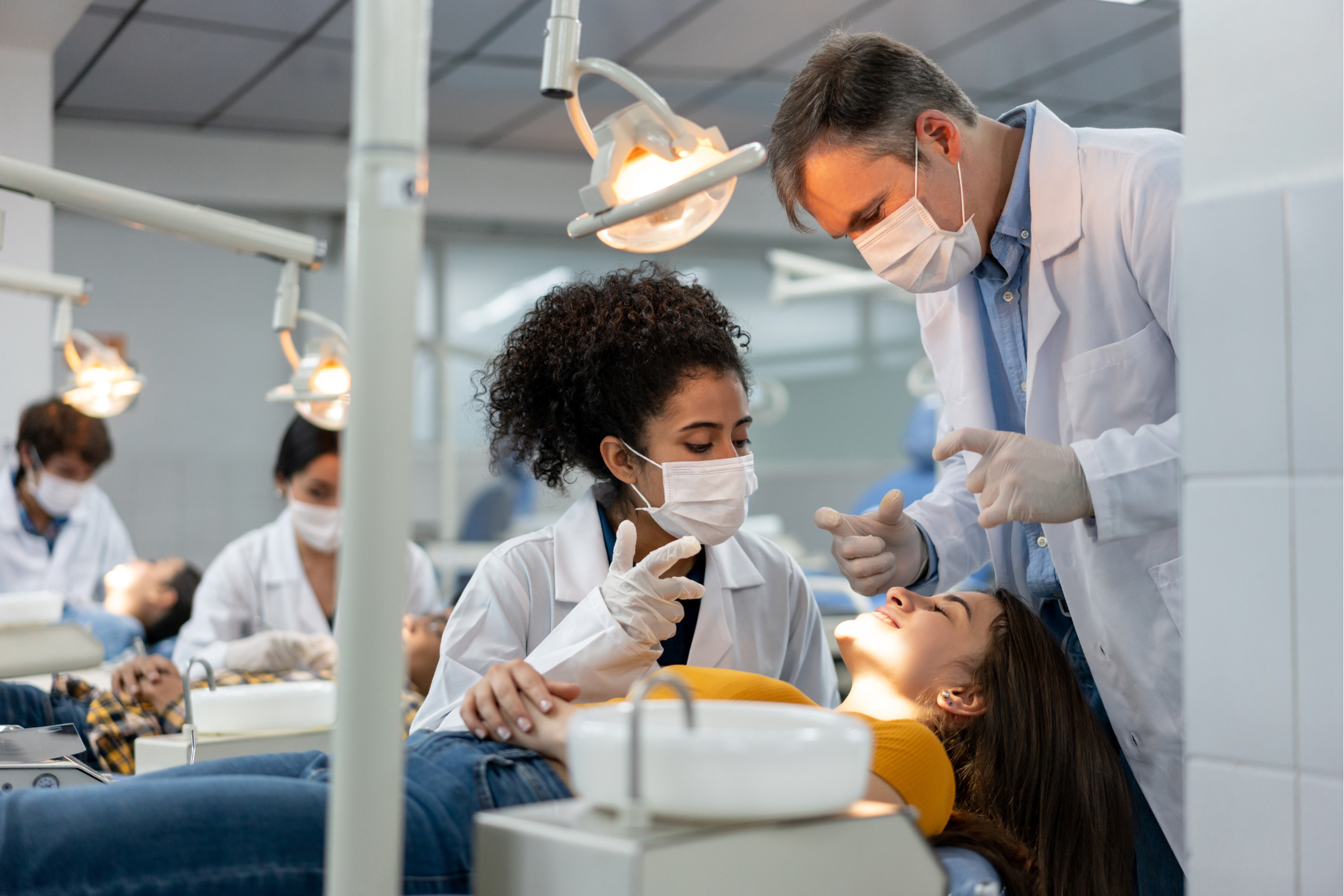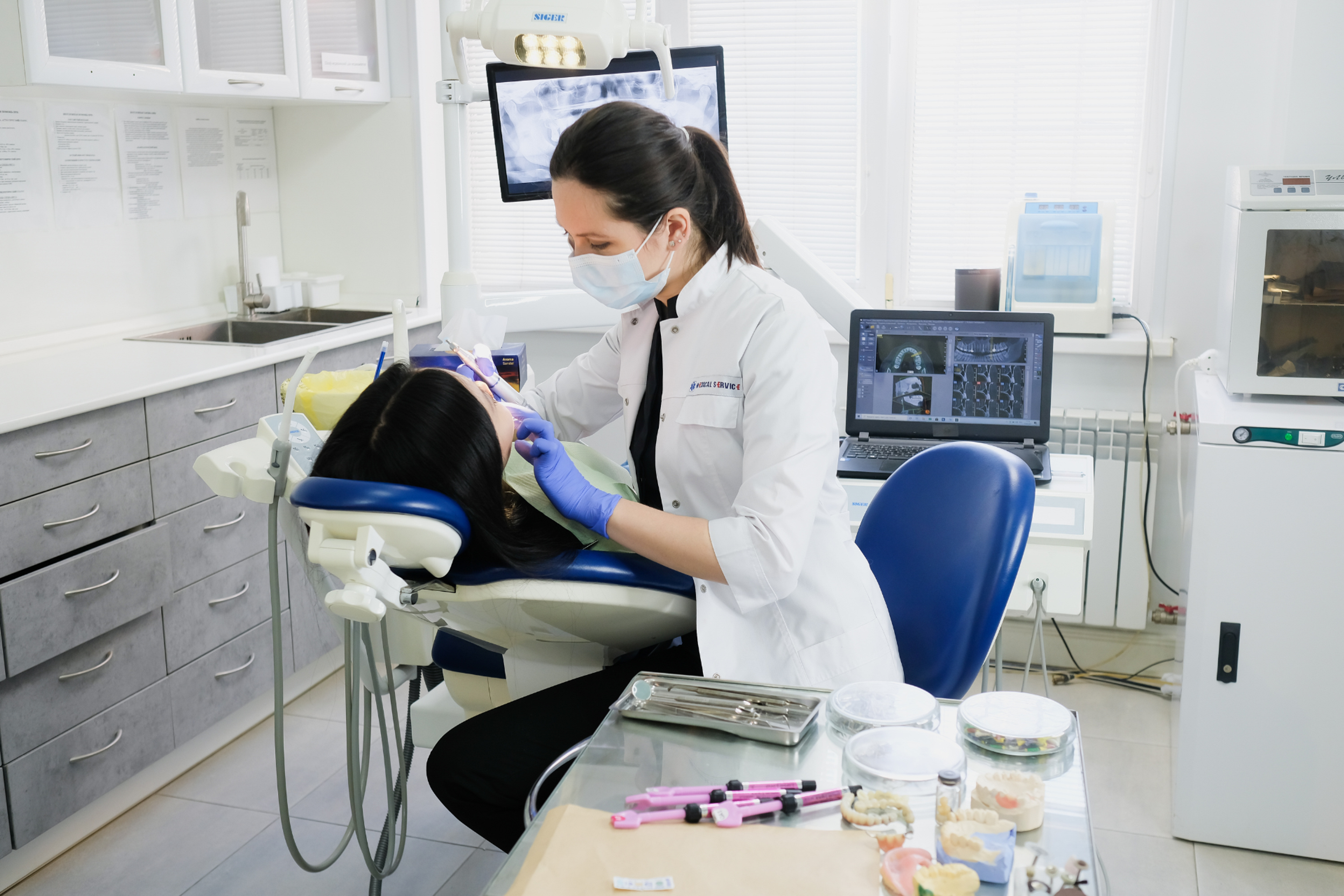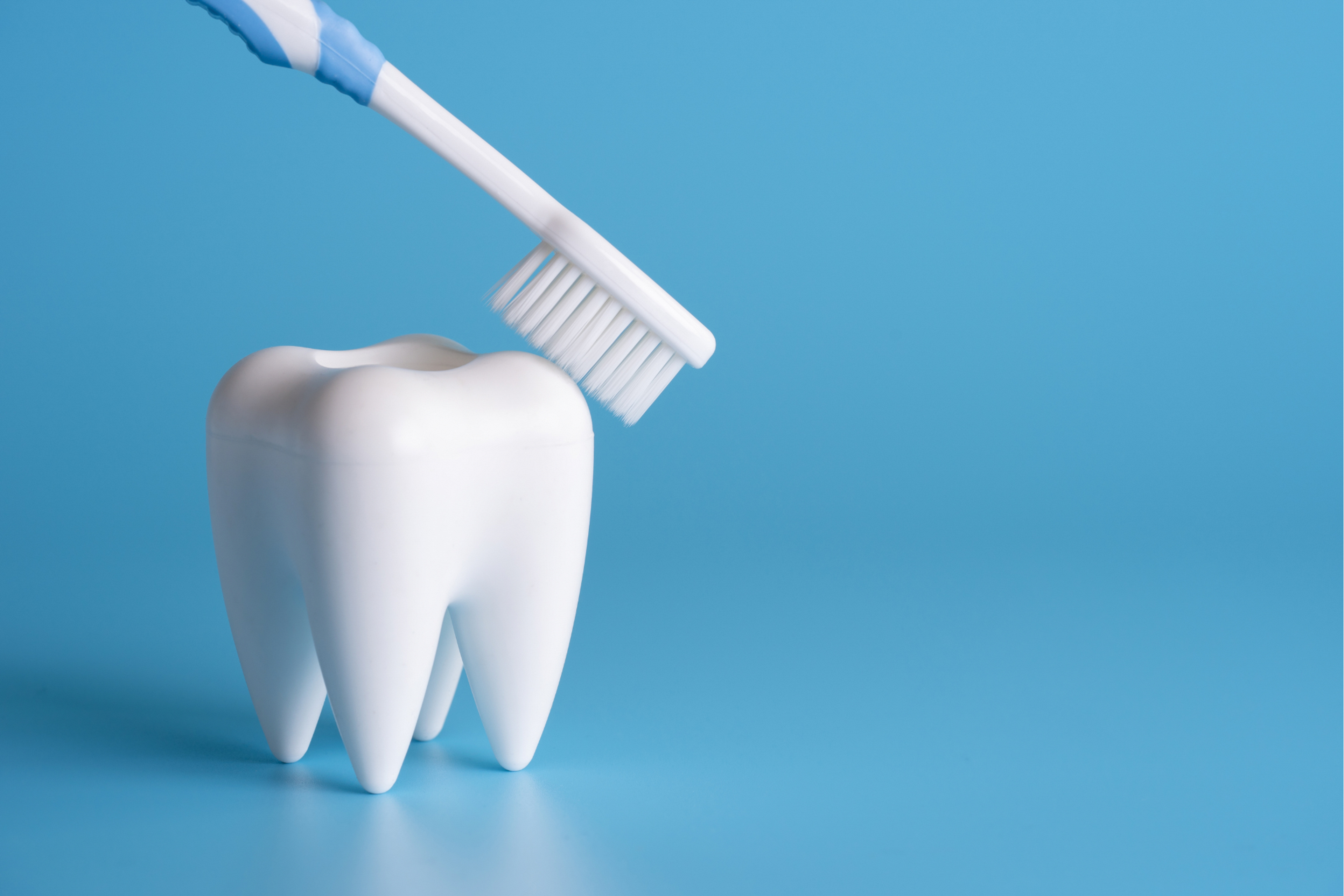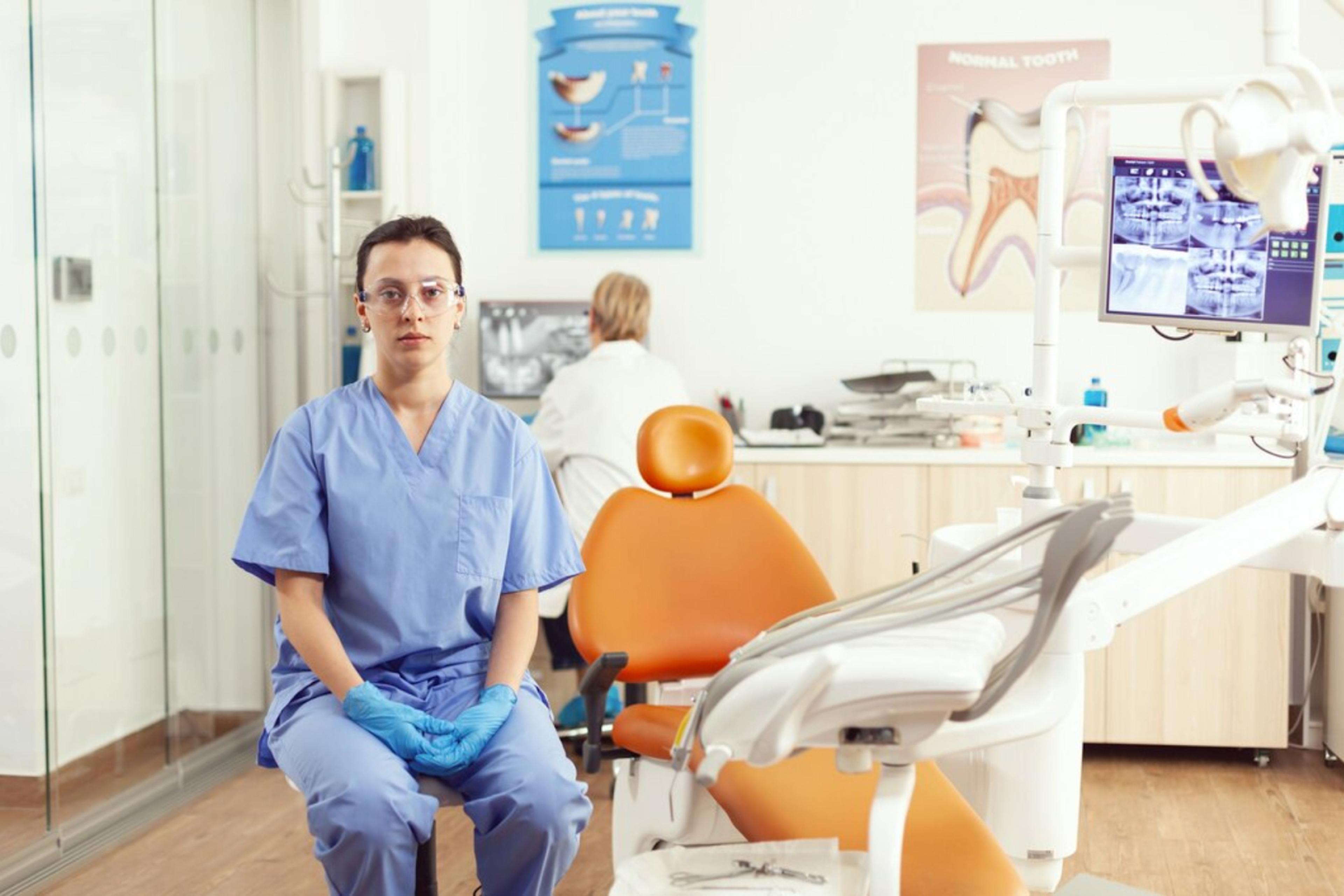Dental School Vs. Medical School: Which One is Right For You
Choosing between dental school and medical school? Discover the differences and similarities to help you decide which path is the best fit for your career aspirations and personal interests.
Posted March 6, 2025

Table of Contents
Choosing between dental school and medical school is a significant decision for students pursuing a healthcare career. Both paths require years of education, clinical training, and a commitment to patient care, but they differ in specialization, work-life balance, and career opportunities.
The medical school includes several years of specialized training during residency, where physicians refine their clinical skills and knowledge in a specialized medical field under the guidance of experienced practitioners. Understanding the key differences between these two paths can help students decide which aligns best with their career goals.

What Is Dental School?
Dental school trains students to become dentists, focusing on oral health, diagnosis, treatment, and disease prevention related to the mouth, teeth, and gums. Dental school students spend four years studying topics such as basic sciences, oral surgery, prosthodontics, and periodontics.
Work with Dental School Admissions Coaches
Applying to dental school is competitive, and an admissions coach can help improve your application. Coaches assist with DAT preparation, personal statements, and interview practice to make applicants stand out. They also provide guidance on choosing the right dental schools and strengthening GPA and clinical experience. With expert help, applicants can increase their chances of acceptance and start their path toward dentistry with confidence.
Curriculum and Training
The dental school curriculum is structured to provide students with both theoretical knowledge and hands-on experience. The first two years are focused on foundational sciences, similar to medical school students, but with a focus on dentistry. The final two years emphasize clinical experiences where students practice dental procedures under supervision.
Typical Dental School Courses
| Year | Focus Area |
|---|---|
| 1-2 | Basic sciences, anatomy, physiology, pathology, pharmacology |
| 3-4 | Clinical rotations, hands-on patient care, specialized dental training |
Admission Requirements
- Bachelor’s degree (science-focused major preferred)
- Standardized tests: Dental Admission Test (DAT)
- Average GPA: Competitive applicants often have a 3.5+ GPA
- Letters of recommendation, personal statement, and relevant experience
Career Paths After Dental School
Graduates receive either a Doctor of Dental Surgery (DDS) or a Doctor of Dental Medicine (DMD) and can begin working after passing licensure exams. Many go into private practices, while others specialize in fields like oral and maxillofacial surgery, orthodontics, or periodontics.

What Is Medical School?
Medical school prepares students to become physicians, diagnosing and treating illnesses affecting the whole body. The program requires four years of education followed by several years of specialized training during residency in a chosen specialty.
Work with Medical School Admissions Coaches
Getting into medical school requires strong academics, clinical experience, and a compelling application. Admissions coaches help applicants improve MCAT scores, write strong personal statements, and prepare for interviews. They also provide advice on choosing the right medical schools and gaining relevant clinical and research experience. With professional guidance, applicants can improve their acceptance rate and feel more prepared for their journey to becoming a medical doctor.
Curriculum and Training
The first two years of med school focus on basic sciences and theoretical learning. The third and fourth years involve clinical rotations, where students gain experience in internal medicine, surgery, psychiatry, pediatrics, and other specialties.
Typical Medical School Courses
| Year | Focus Area |
|---|---|
| 1-2 | Basic sciences, pathology, pharmacology, microbiology |
| 3-4 | Clinical rotations, exposure to various specialties |
Admission Requirements
- Bachelor’s degree (science-focused major preferred)
- Standardized tests: Medical College Admission Test (MCAT)
- Average GPA: Competitive applicants typically have a 3.7+ GPA
- Medical school application includes a personal statement, letters of recommendation, and clinical experience
Career Paths After Medical School
After completing medical school, students earn either a Doctor of Medicine (MD) or Doctor of Osteopathic Medicine (DO) and enter residency training, which can last between three and seven years depending on the specialty. Specialties include internal medicine, oral and maxillofacial surgery, cardiology, neurology, and more.
Key Differences Between Dental and Medical School
| Category | Dental School | Medical School |
|---|---|---|
| Duration | 4 years | 4 years + residency (3-7 years) |
| Focus | Oral health, teeth, gums | Patient care, whole-body health |
| Clinical Experience | Hands-on training starts earlier | Clinical rotations begin in year 3 |
| Standardized Test | DAT | MCAT |
| Tuition Fees | High but usually less than med school | Typically higher due to longer training |
One noticeable difference between dental and medical schools is the duration of the program. Dental school typically takes four years to complete, while medical school usually takes four years of classroom instruction followed by several years of residency training, depending on the chosen specialization. Similarly, gaining admission to vet school is highly competitive, with a significant disparity between the number of applicants and available seats.
Career Prospects: Job Market and Work-Life Balance
Both dental and medical careers offer rewarding careers, but work environments and work-life balance differ.
Dentists
- Many work in private practices and set their own work hours.
- Typically have regular working hours with predictable schedules.
- High demand for oral health specialists.
- Can begin practicing immediately after four years of school.
Doctors
- Longer training period due to residency.
- Irregular hours, especially during residency.
- More variety in many specialties.
- Higher earning potential over time.
Financial Considerations
Tuition fees for both dental and medical schools are high, often requiring loans. Medical students typically graduate with more debt due to the additional several years of training.
| Expense | Dental School | Medical School |
|---|---|---|
| Tuition | $200,000 - $400,000 | $250,000 - $500,000 |
| Residency Salary | Not required | $60,000 (during residency training) |
| Starting Salary | $150,000 - $250,000 | $200,000 - $500,000 (varies by specialty) |
Loan forgiveness programs are available for both professions, particularly for those working in underserved areas.
Which Path Fits Your Career Goals?
The decision between dental school vs. medical school depends on personal interests, financial situation, and career expectations.
Choose Dental School If You:
- Enjoy working with your hands and focusing on oral health.
- Prefer regular working hours and a predictable schedule.
- Want to begin working immediately after four years of education
Choose Medical School If You:
- Are interested in many specialties and broader patient care.
- Are prepared for a long training process, including residency.
- Are open to working irregular hours during clinical experiences and beyond.
Making the Decision: Dental School or Medical School?
Assessing Your Personal Interests and Skills
Consider your personal interests, strengths, and aptitudes. Are you more passionate about the intricate details of oral health or the complexities of internal medicine? Reflecting on your natural abilities and preferences can help guide your decision.
Weighing the Pros and Cons
Weigh the pros and cons of each profession. Consider factors such as program duration, cost of education, potential salary, career opportunities, work hours, and work-life balance. Taking a comprehensive approach to evaluating these elements will provide you with a clearer picture of what aligns best with your goals.
Read: Is Med School Worth It? Weighing the Pros and Cons
Seeking Guidance and Mentorship
Finally, seek guidance from professionals in the dental and medical fields, such as practicing dentists and doctors. They can provide invaluable insights based on their personal experiences and help you navigate the decision-making process. Additionally, consider shadowing professionals in both fields to get a firsthand experience of their day-to-day work and responsibilities.
Bottom Line
Both dental school and medical school lead to fulfilling careers in healthcare. Dental school students focus on dentistry, oral surgery, and disease prevention, while medical students study internal medicine, patient care, and clinical rotations across many specialties. The choice between dental and medical careers depends on personal interests, work-life balance preferences, and financial considerations.
Related Articles
If you’re exploring the differences between dental school and medical school, these articles can provide more insights and guidance:
- What Do You Learn in Dental School?
- DMD vs. DDS: What's the Difference and Which is Better?
- Everything You Need to Know About Dental School
- The Ultimate Guide to the Medical School Application
- Preparing for Medical School: A Comprehensive Guide
- Exploring Dental School Curriculums: Courses and Requirements
- How to Pay for Dental School: A Guide to Financial Aid
- How to Become a Dentist: The Complete Guide to a Fulfilling Career in Dentistry
- Dental School Shadowing Hours: General Vs. Specialty Dentist
FAQs
What dental school is the easiest to get into?
- Some dental schools have higher acceptance rates and lower average GPA and DAT score requirements, making them more accessible. Private schools may also have more flexible admission policies. However, getting into any dental school still requires strong academic performance, relevant experience, and a well-rounded application. Researching schools with higher acceptance rates and considering out-of-state or private institutions can increase the chances of admission.
Is dentistry a medical course?
- Dentistry is a healthcare profession but is not classified as medical school. While it shares foundational basic sciences with medicine, dental school focuses on oral health, disease prevention, and dental procedures. Dentists are considered healthcare professionals, but they do not go through medical school or receive an MD degree. Instead, they earn a DDS (Doctor of Dental Surgery) or DMD (Doctor of Dental Medicine).
What is the hardest year of dental school?
- Many dental students find the second year to be the most challenging due to the intensive basic sciences, preclinical lab work, and exams. This is the transition phase before students begin treating real patients. The first year can also be difficult due to the adjustment to a heavy workload. The third and fourth years involve clinical experiences, which are demanding but offer more hands-on learning.
What is the hardest field in dentistry?
- Oral and maxillofacial surgery is often considered the most challenging specialty due to the extensive residency training (4-6 years) and the complexity of procedures like jaw reconstruction and facial trauma surgery. Other demanding specialties include:
- Endodontics (root canal therapy and nerve treatments)
- Prosthodontics (complex restorations and full-mouth reconstructions)
- Orthodontics (alignment of teeth and jaw through braces and surgical interventions)
What is the fastest way to become a dentist?
- The traditional path takes eight years: four years for a bachelor’s degree and four years of dental school. However, some accelerated programs allow students to complete both in six or seven years. These combined BS/DDS or BS/DMD programs are offered by some universities and allow students to enter dental school earlier by shortening their undergraduate studies. Another option is to take summer courses or AP credits in high school to reduce undergraduate time.












